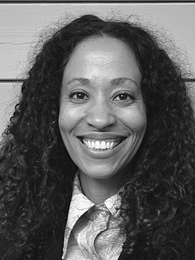POETS & WRITERS IS MORE than a magazine. We are a nonprofit organization that puts money directly into the hands of writers who give readings and lead workshops in museums, prisons, homeless shelters, libraries, and senior centers. Your subscription to Poets & Writers Magazine supports the all-important work of cultivating literary activity in urban and rural communities throughout the United States.
Effort & Generosity Combined
Houston, Texas–based writer Adrienne Perry earned her MFA from Warren Wilson College and is a PhD student in literature and creative writing at the University of Houston. She is the editor of Gulf Coast and a Kimbilio Fellow. Her work has appeared or is forthcoming in Tidal Basin Review, Copper Nickel, and the Indiana Review. She is at work on a novel and a collection of short stories. This essay appeared in an earlier form on the Readings & Workshops Blog (pw.org/blogs/rw_blogger).
 On a hot, gray morning late last June I drove to Houston’s Old Sixth Ward to meet with Elizabeth White-Olsen, the founder and director of Writespace. Sitting in the brightly painted room nestled within Silver Street Studios, I found it hard to believe that Writespace was barely three months old. Black-topped desks from IKEA, charming pen-and-ink portraits of authors such as Emily Dickinson and Gabriel García Márquez, a potted palm, a reading lamp—Writespace is a refuge created with warmth, care, and few distractions. A writer could do good work here.
On a hot, gray morning late last June I drove to Houston’s Old Sixth Ward to meet with Elizabeth White-Olsen, the founder and director of Writespace. Sitting in the brightly painted room nestled within Silver Street Studios, I found it hard to believe that Writespace was barely three months old. Black-topped desks from IKEA, charming pen-and-ink portraits of authors such as Emily Dickinson and Gabriel García Márquez, a potted palm, a reading lamp—Writespace is a refuge created with warmth, care, and few distractions. A writer could do good work here.
“What kind of workshops would you like to lead?” Elizabeth asked. I shared my wish to create a workshop for Houston-based writers of color. The deep, soul-sustaining communities developed through organizations like Cave Canem, Kundiman, VONA, and Kimbilio have transformed the writing and careers of many writers of color, myself included. As citizens of one of the most diverse cities in the country, one with a bustling literary and arts scene to boot, couldn’t we create a similar experience for Houstonians? Not a retreat per se, but rather a space where unconscious assumptions about who writers of color are, how their voices sound, and what they write about would hold no sway?
Yes, we could. Nine months later, right around Writespace’s first birthday, the workshop came together. It would not have happened without: 1) Elizabeth and her volunteers pounding the pavement, and 2) the grant we received from Poets & Writers’ Readings & Workshops program. Effort and generosity—these two combined to make a workshop that, in the words of workshop participant Charles Redd, “created something special in me, impacted by shared experiences.” Another writer from the workshop, Ima Oduok, wrote: “When I saw Writespace was hosting a workshop for writers of color, I was ecstatic. The literary world is still mostly filled with white men, and that imbalance makes me hold back in other workshops or conferences. There’s an unspoken, unsubtle message that literature is not for us.” The six writers in our workshop pushed back against that unsubtle message. They ranged from those just starting their writing journey to others who have won fellowships, drafted novels, and attended MFA programs. First-generation, rural, bilingual, multiracial, urban, suburban, and from across the country—these writers proved just how capacious literature should be.
Writespace is all about making room for all genres, all kinds of folks—no pedigree necessary. As a “grassroots literary arts organization founded by writers, for writers,” Writespace nurtures poetry and prose that might otherwise remain unwritten. This was the workshop’s goal too, as it gave space to voices and stories capable of expanding the boundaries of both white and nonwhite readers’ imaginations: a man in San Antonio who made perfect raspas, a waitress who Tasers an attacker after a late-night shift, the dissolution of a marriage as seen through a favorite TV show. To encourage each other’s writing and ideas, we didn’t just dish out high fives. Instead, we offered a generous critique based on our effort to meet each story or essay on its own terms. What patterns did we see and what possibilities did they offer? What did the work before us suggest it wanted to become?
On the last day of workshop, we ended early for a reading. We hid the tables in the hallway and set up tight rows of chairs, wondering who besides our friends and family would fill the seats. Turns out, quite a few. By the time the reading started, the room was packed, the cheap wine was almost gone, and we looked around at a mix of faces both familiar and new.
Next week, the focus is on familiar faces. We’re meeting at a taqueria to kiki (chew the fat) and to share how our writing is going. A year ago, we didn’t have this workshop community for writers of color in Houston. Thankfully, support from Poets & Writers gave us the resources to get one started.
Photo Credit: Lesli Vollrath







